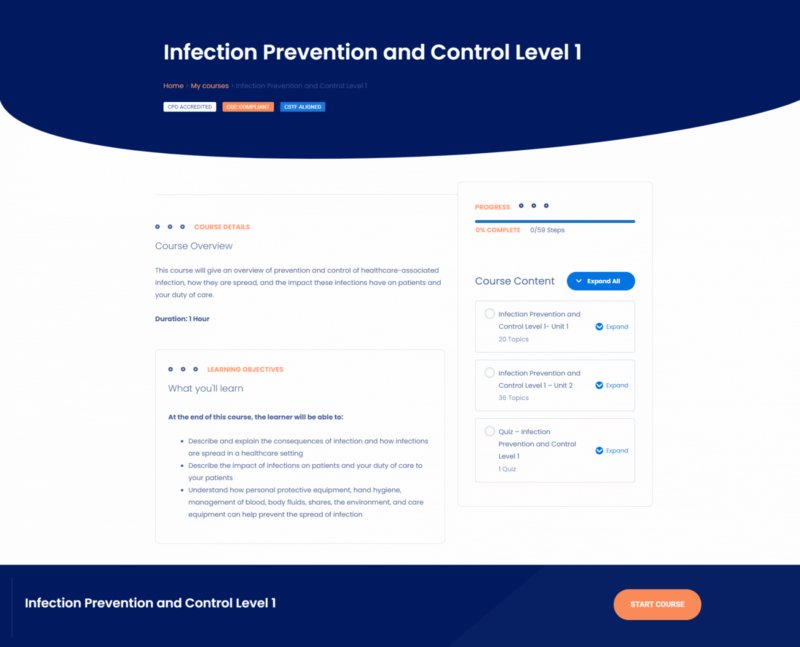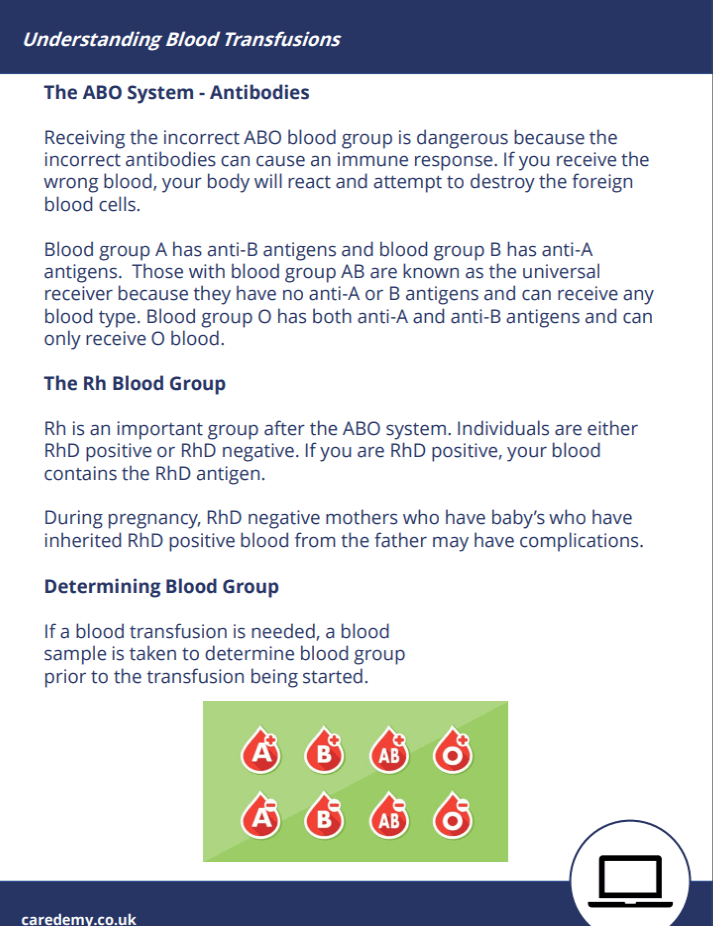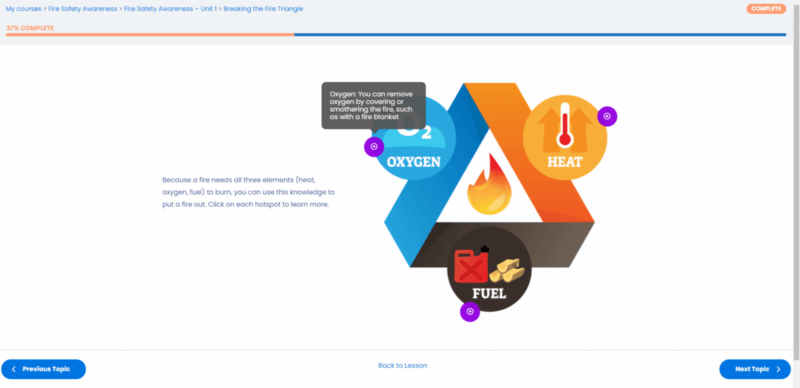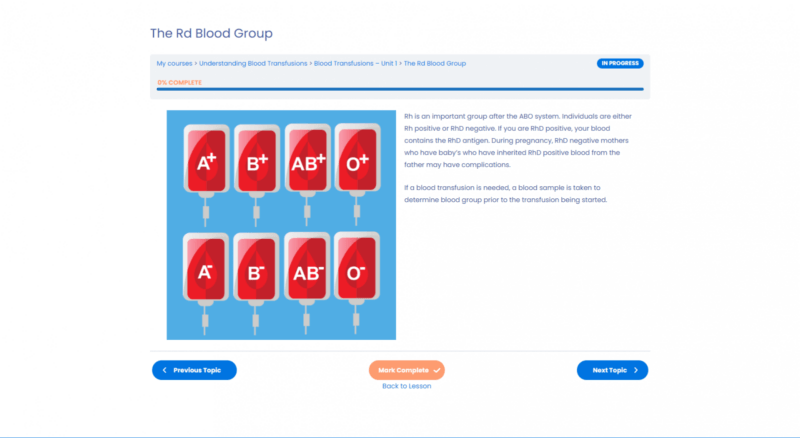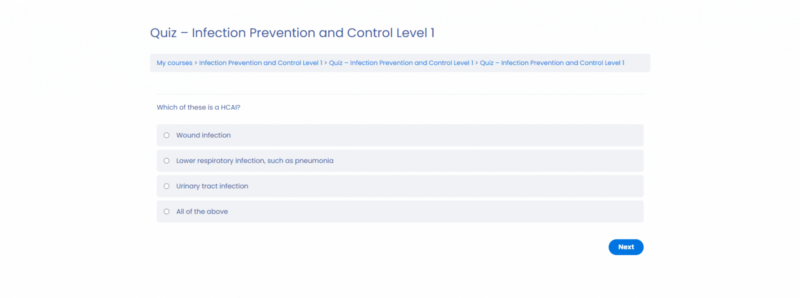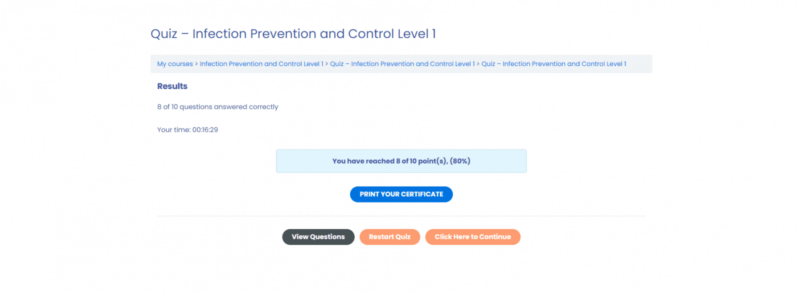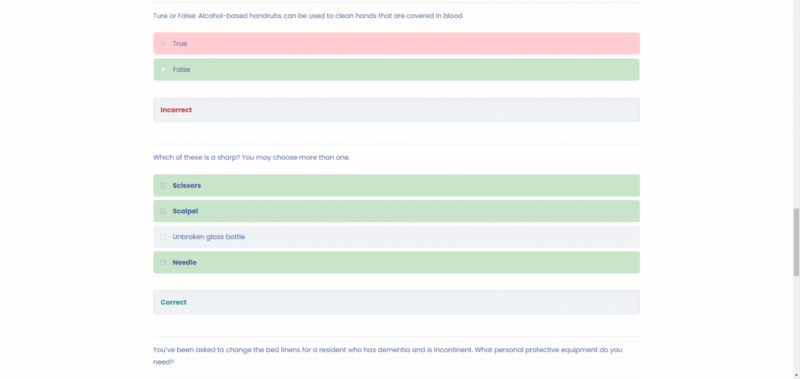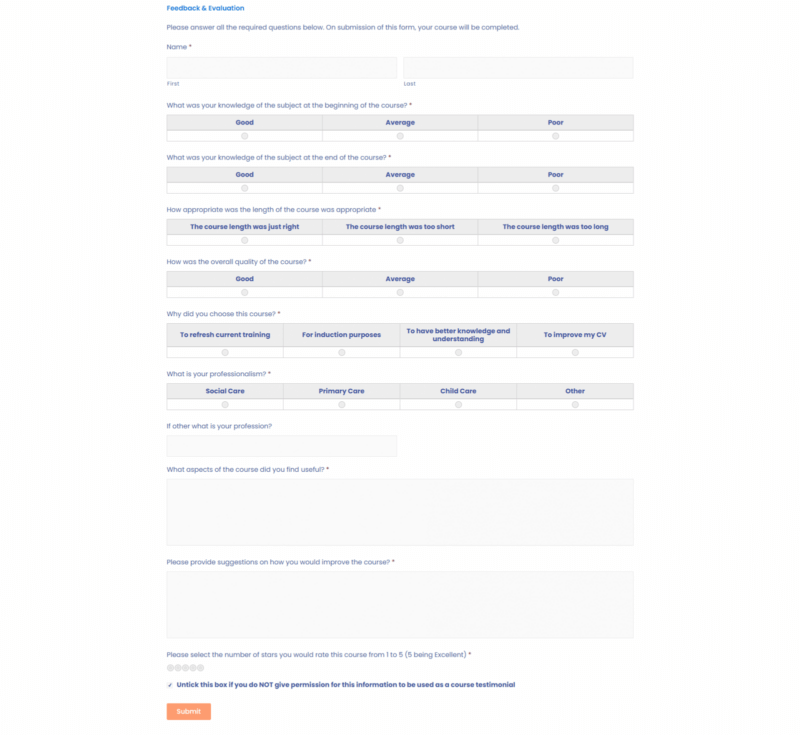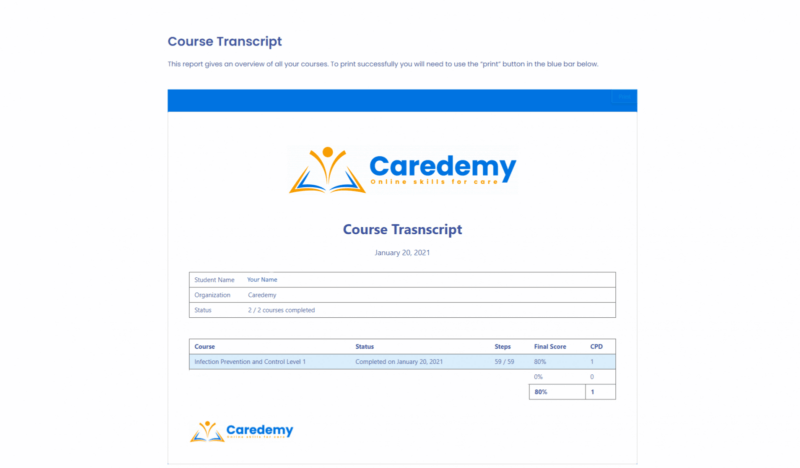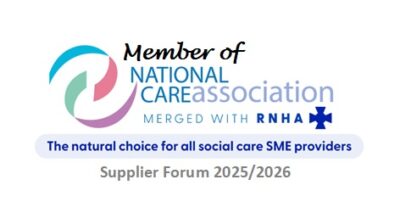Food Hygiene And Safety For Residential Care Homes (Level 2) Course
£20.00 Original price was: £20.00.£9.47Current price is: £9.47. +VAT


Hanna Ward
Environmental Health Officer (EHO)
This course will give an overview of food safety and hygiene regulations that outline the preparation and sale of food that is safe to eat.
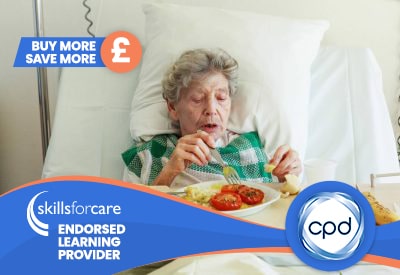

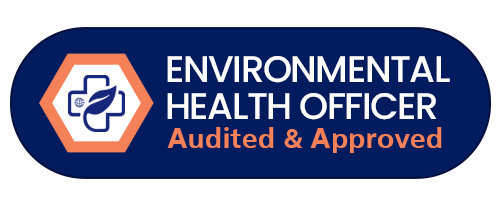
Duration: 1 to 3 Hours
4.9 🌟🌟🌟🌟🌟
17,493 Reviews
Course updated To Latest Regulations
Course details
Food Hygiene And Safety For Residential Care Homes (Level 2) Online Training Overview
This course will give an overview of food safety and hygiene regulations that outline the preparation and sale of food that is safe to eat.
This course meets regulations for food handlers in the United Kingdom.
Duration: 1 Hour CPD Points: 1
What You will learn
Food Hygiene And Safety For Residential Care Homes (Level 2) Course Learning Objectives
At the end of this course, the learner will be able to:
- Understand how to comply with food hygiene regulations
- Demonstrate how to make food safely
- Describe how to train staff members in proper food safety
Lessons
Course Content
- Course Introduction – Food Safety Management for Residential Care Homes
- Food Hygiene Ratings
- Understanding Your Food Hygiene Rating
- Best Practices When Working with Food
- Hand Washing
- Cross-Contamination
- Cloths
- Separating Foods
- Food Allergies
- Common Allergens
- Managing an Allergic Reaction
- Physical and Chemical Contamination
- Pest Control
- Maintenance
- Extra Care: Protecting Food
- Cleaning
- High Priority Cleaning
- Dishwashers & Other Cleaning
- Managing Food Waste
- Cleaning Schedules
- Chilling Foods
- Chilling Down Hot Food
- Defrosting
- Freezing
- Cooking
- Properly Cooked Foods
- Foods Requiring Extra Care
- Reheating
- Acrylamide
- Hot Holding
- Ready-to-Eat Food
- Management
- Additional Checks
- Managing Allergen Information
- Training and Supervision
- Customers
- Suppliers and Contractors
- Stock Control
- Product Withdrawal and Recall
- Mini Kitchens
- Gift Food
- Donated Food
On successful completion of the quiz, you will be awarded a CPD accredited Food Hygiene And Safety For Residential Care Homes (Level 2) free course certificate.
Who is this for?
Who is this Food Hygiene And Safety For Residential Care Homes (Level 2) training for?
This online course has been written at an introductory level 2 that fit the criteria to take training as part of their role. This includes:
- Refresher training
- Inductions
- Awareness
- Knowledge enhancement
Food Hygiene And Safety For Residential Care Homes (Level 2) Training: Who Is It For?
The Food Hygiene And Safety For Residential Care Homes (Level 2) Training Course in the UK is specifically designed for individuals working in residential care homes, including those responsible for handling, preparing, and serving food to residents. This course is essential for ensuring that food hygiene and safety standards are upheld to protect the vulnerable individuals residing in care homes. The Food Hygiene And Safety For Residential Care Homes training course is particularly relevant for:
Care Home Kitchen Staff: Individuals working in the kitchen of a residential care home, such as cooks, kitchen assistants, and catering staff, are primary candidates for the Food Hygiene And Safety For Residential Care Homes training course. These staff members are directly involved in the preparation and service of meals to residents, making it vital for them to have a thorough understanding of food hygiene principles, safe food handling practices, and hygiene regulations specific to care home environments. By completing this course, kitchen staff can ensure the meals provided to residents are safe, nutritious, and prepared in a hygienic manner.
Care Home Managers and Supervisors: Care home managers and supervisors oversee the operations of the care home, including the food service processes and kitchen facilities. Enrolling in the Food Hygiene And Safety For Residential Care Homes training course is crucial for care home managers and supervisors to demonstrate leadership in promoting a culture of food safety within the care home setting. By acquiring knowledge of food hygiene regulations, allergen management, and risk assessment practices, managers and supervisors can ensure that all staff members adhere to best practices in food safety, ultimately safeguarding the health and well-being of residents.
Care Home Support Workers: Care home support workers who assist with meal service, dining supervision, or resident care play a crucial role in maintaining food hygiene and safety standards within a care home. These staff members may benefit from participating in the Food Hygiene And Safety For Residential Care Homes training course to enhance their understanding of food safety principles, personal hygiene practices, and infection control measures relevant to food handling in a care home setting. By completing this course, care home support workers can contribute to creating a hygienic and safe dining environment for residents, reducing the risk of foodborne illnesses and cross-contamination.
Registered Nurses and Healthcare Professionals: Registered nurses and healthcare professionals working in residential care homes have a responsibility to promote the health and well-being of residents, including ensuring food hygiene and safety standards are met. Participating in the Food Hygiene And Safety For Residential Care Homes training course can equip registered nurses and healthcare professionals with the knowledge and skills to assess food safety risks, address dietary requirements, and facilitate safe food practices in a care home setting. By understanding the importance of food hygiene, nurses and healthcare professionals can uphold quality standards of care and contribute to the overall health outcomes of residents.
Maintenance and Cleaning Staff: Maintenance and cleaning staff in residential care homes also play a significant role in ensuring the cleanliness and hygiene of kitchen areas, dining facilities, and food storage spaces. These staff members can benefit from enrolling in the Food Hygiene And Safety For Residential Care Homes training course to learn about the importance of sanitation, pest control, and environmental hygiene in maintaining a safe food environment for residents. By gaining insights into food safety practices, maintenance and cleaning staff can support the overall hygiene standards of the care home and contribute to resident safety.
The Food Hygiene And Safety For Residential Care Homes (Level 2) Training Course in the UK targets individuals involved in food handling and provision within residential care homes, with a focus on protecting the health and safety of residents. By completing this course, care home kitchen staff, managers, support workers, healthcare professionals, and maintenance staff can ensure that food served in care homes meets high standards of hygiene, reducing the risk of foodborne illnesses and promoting the well-being of residents. Ultimately, this course supports the delivery of quality care in residential settings by emphasizing the importance of food safety and hygiene practices.
Food Hygiene And Safety For Residential Care Homes (Level 2) FAQ
Food Hygiene And Safety For Residential Care Homes (Level 2) Frequently Asked Questions
Your course is instantly allocated to you upon completion of your purchase.
Yes, the Food Hygiene And Safety For Residential Care Homes (Level 2) course has been assessed and awarded a CPD accreditation by the CPD standards office.
Upon successful completion of the quiz at the end of the course, you will be instantly awarded a CPD accredited Food Hygiene And Safety For Residential Care Homes (Level 2) course certificate to download or print at home for free. We also have an option for you to request a hard copy of the certificate sent to your home or work address.
Yes, the Food Hygiene And Safety For Residential Care Homes (Level 2) course comes complete with unlimited exam retakes
Yes, the Food Hygiene And Safety For Residential Care Homes (Level 2) course will aid refresher training. It will give evidence of an understanding for staff induction. It will evidence awareness and improve your knowledge aiding your current skillset. A certificate is awarded upon completion.
We offer a complimentary learner management system to view the learner's course progress, view quiz results and certification. We also offer a dedicated compliance matrix to aid with audits and inspections.
Level 2 Food Hygiene And Safety For Residential Care Homes
All UK food handlers must undergo food safety training to ensure that the food they prepare and serve is safe to eat. Employers in food handling businesses have a legal obligation to ensure that both employees and volunteers are properly trained in food hygiene, so that they can carry out their roles safely and effectively.
The Caredemy Basic Food Hygiene and Safety course provides general food safety information suitable for all food handlers. However staff working in the social care sector may need more specific information on safely preparing food in a care home.
The Caredemy Level 2 Food Hygiene and Safety for Residential Care Homes course provides food safety and hygiene training which meets the appropriate regulations for UK food handlers in residential care settings.
Why is food safety important in residential care homes?
It is vital to maintain the highest standards of food safety and food hygiene in residential care homes. Food in care homes must always be safe to eat, as elderly and vulnerable residents are generally at higher risk of food poisoning. This could lead to dehydration, gastroenteritis and other serious health issues in an elderly person.
Older people also tend to have weaker immune systems, which can leave them more vulnerable to infections such as E. coli. The risk of this can be reduced by implementing good food hygiene in care settings.
Effective food safety procedures will ensure that anyone who handles, prepares or serves food in the care setting complies with the relevant food hygiene and food safety standards. These procedures can also help to reduce food waste and improve profitability in the care setting.
Who is this food safety course suitable for?
This Level 2 Food Hygiene course for Residential Care Homes is appropriate for all staff who handle food within a residential care setting including chefs, cooks and kitchen assistants. It is also appropriate for anyone who serves food to residents, whether working as an employee or a volunteer.
Managers and supervisors who want to understand the principles underpinning food safety in care homes will also benefit from this course.
The course is suitable for use both as induction training for new staff and ongoing refresher food hygiene training for existing residential care staff.
What does the Level 2 Food Hygiene for Residential Care Homes course cover?
After completing this course, learners will know the food hygiene regulations that apply to residential care settings and understand how to comply with them. They will be able to demonstrate their knowledge of safe food preparation and will also be able to instruct other staff and volunteers in the principles of good food safety.
This course has a single unit covering a wide range of topics relating to food safety in care homes. Hygiene ratings and good hygiene practices are explained along with the steps that are required to avoid cross-contamination. Common food allergens and allergic reactions including anaphylaxis are also explained.
Cleanliness in the kitchen is covered, and learners will be instructed on how to manage food waste and pest control. The course also includes information on how to chill, freeze, defrost and reheat food safely.
As well as providing information regarding suppliers, contractors and stock control, this course provides advice on handling gifted and donated food, which is an issue very specific to food hygiene in residential care settings.
It will take approximately 1 hour to complete this food safety course for residential care homes. The course is followed by a multiple-choice exam with a 70% pass mark, and free exam resits are included in the course fee if required.
Learners who successfully complete the course and exam will be awarded 1 CPD point and can download a free CPD-accredited Level 2 Food Hygiene certificate.
Caredemy Food Hygiene online courses
Caredemy’s online academy offers a range of online food safety training courses. They are all CPD-accredited and are written by industry experts to meet the regulations for UK food handlers. In addition to this, we also provide a range of online care skills courses that meet the requirements of the CQC (Care Quality Commision).
Food hygiene online courses are a highly convenient way to fit this vital training into a busy schedule, which may be a particular concern to those working in the health and social care sector. Instant access allows you to get on with studying as soon as payment has been received and our online Learner Dashboard helps you to keep track of your progress. It also allows managers to monitor learners’ certification, helping them to maintain accurate staff training records ready for inspection time.
We’re confident that you’ll be satisfied, so we offer a 14 day Money Back Satisfaction Guarantee on all Caredemy food hygiene online courses
To find out more about the Level 2 Food Hygiene and Safety for Residential Care Homes course, you can visit the course page on our website or call our Student Support team on 0203 488 7599 to book your course over the phone. If you have any further queries, you can also email our Student Support team who will be happy to help.
Information
How our courses work
Purchase
Add your course(s) to checkout & pay
Learn
Instant course(s) allocation. No waiting!
Assess
Pass the exam to obtain a certificate
Image examples
Take a peek at some of the materials
How it works:
Assessment & Certification
You will be given a multiple-choice exam available at the end of the learning, you will be graded. On a pass mark of 70% or higher a certificate is issued.
You may retake the test at your convenience at no additional cost.
On completion of the exam, a free certificate is instantly available for you to download or print.
A hard copy certificate printed on certificate grade paper can be purchased for a nominal fee via your learner dashboard and are dispatched within one working day to your address.
Limited Time Offer: Flash Sale Alert! ⚡
14-Day Money-Back Guarantee
£20.00 Original price was: £20.00.£9.47Current price is: £9.47. +VAT
If you are purchasing for someone else tick this box.
You will allocate the course after purchase to an alternate person(s)
CPD Accredited
Downloadable workbook
Free instant certificate
Audio playback included
12-month anytime course access
Compliant to the care frameworks
Multiple choice exam & resits included
Available in 50 languages
11,987 enrolled in this course
£20.00 Original price was: £20.00.£9.47Current price is: £9.47. +VAT
If you are purchasing for someone else tick this box.
You will allocate the course after purchase to an alternate person(s)
Matrix Colour Coded Reorting
Exportable User Reporting
Instant Access Upon Enrolment
CSV Course Reporting
Set Course Renewal Dates
Bulk Download Certificates
Notification Selection For Email Options
Learner Certificate Toggle On/Off
1,933 already enrolled on this course
BULK ORDERS. SAVE MORE
Great Deals For Individuals and Teams


